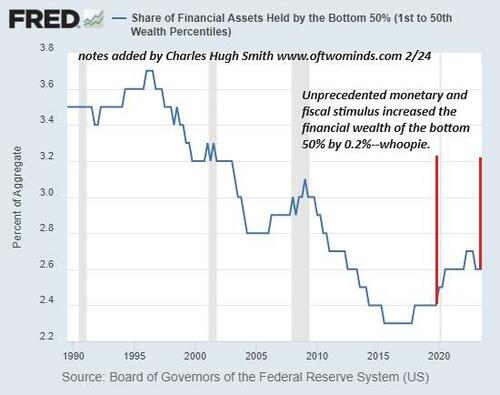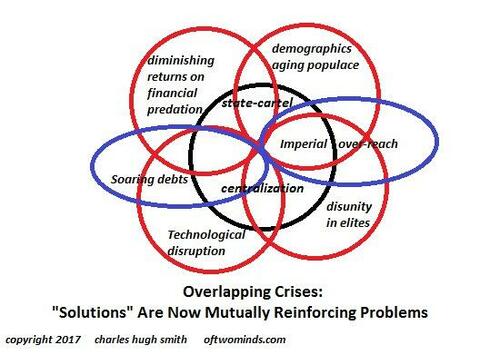
Authored by Charles Hugh Smith via OfTwoMinds blog,
What is acceptable, and what is unacceptable? We'll soon have to decide.
I wish the transition ahead--the unwinding of all the distortions and sources of instability in our economy and society--could be painless. That would be ideal. But history suggests that hope is unrealistic. History suggests those in power will cling to whatever is working well for them even as the economy and society decay and decohere around them.
Denial and magical thinking are the order of the day. Rome is eternal, so there's nothing to worry about. If the peasants have no bread, let them eat brioche. And so on.
If the painless option is off the table, then the issue boils down to the distribution of the pain. Ideally, those least able to sustain further sacrifices will be favored at the expense of those better able to sustain sacrifices. But those most able to sustain sacrifices are those with the power to distribute the pain to others. This dynamic leads to those least able to sustain sacrifices being distributed the majority of the pain, to the point that they have so little to lose that abandoning the status quo becomes the least worst option.
The data collected by Italian researcher Vilfredo Pareto revealed a pattern throughout Nature and civilization of 80/20 distributions, what we call the 80/20 Rule or the Pareto Distribution: 20% of the sales staff make 80% of the sales, 20% of the populace ends up owning 80% of the property, 20% of the plants produce 80% of the seeds that sprout, and so on.
The Pareto Distribution distills down to 80% of 80% and 20% of 20%, or 4/64: 4% of the populace ends up with 64% of the property. In the U.S., the top 10% own 93% of the stocks, and it's likely the top 5% own 65%--in line with the Pareto Distribution. The bottom 50% own 2.6% of all financial assets.(See Federal Reserve chart below.) This is in line with the Pareto Distribution: the bottom 64% own about 4% of the nation's financial assets.
The issue thus becomes how best to avoid the dire consequences of the 4% at the top of the wealth-power pyramid distributing 64% of the pain to those at the bottom. Unfortunately, the pain will be distributed unevenly regardless of our intentions: highly paid people in unsustainably costly industries will be laid off along with people in more precarious jobs.
Our most realistic hope is to do our best to ease the burdens of those who will suffer the most severe dislocations and shift some of the sacrifices to those with sufficient means to cushion them from any real suffering. We can rethink our winner take most financial system, our duct-taped social contract, our enfeebled civic virtue and our waste is growth Landfill Economy.
Or we can let the system run to failure and let the Devil Take the Hindmost. What is acceptable, and what is unacceptable? We'll soon have to decide.
* * *
Authored by Charles Hugh Smith via OfTwoMinds blog,
What is acceptable, and what is unacceptable? We’ll soon have to decide.
I wish the transition ahead–the unwinding of all the distortions and sources of instability in our economy and society–could be painless. That would be ideal. But history suggests that hope is unrealistic. History suggests those in power will cling to whatever is working well for them even as the economy and society decay and decohere around them.
Denial and magical thinking are the order of the day. Rome is eternal, so there’s nothing to worry about. If the peasants have no bread, let them eat brioche. And so on.
If the painless option is off the table, then the issue boils down to the distribution of the pain. Ideally, those least able to sustain further sacrifices will be favored at the expense of those better able to sustain sacrifices. But those most able to sustain sacrifices are those with the power to distribute the pain to others. This dynamic leads to those least able to sustain sacrifices being distributed the majority of the pain, to the point that they have so little to lose that abandoning the status quo becomes the least worst option.
The data collected by Italian researcher Vilfredo Pareto revealed a pattern throughout Nature and civilization of 80/20 distributions, what we call the 80/20 Rule or the Pareto Distribution: 20% of the sales staff make 80% of the sales, 20% of the populace ends up owning 80% of the property, 20% of the plants produce 80% of the seeds that sprout, and so on.
The Pareto Distribution distills down to 80% of 80% and 20% of 20%, or 4/64: 4% of the populace ends up with 64% of the property. In the U.S., the top 10% own 93% of the stocks, and it’s likely the top 5% own 65%–in line with the Pareto Distribution. The bottom 50% own 2.6% of all financial assets.(See Federal Reserve chart below.) This is in line with the Pareto Distribution: the bottom 64% own about 4% of the nation’s financial assets.
The issue thus becomes how best to avoid the dire consequences of the 4% at the top of the wealth-power pyramid distributing 64% of the pain to those at the bottom. Unfortunately, the pain will be distributed unevenly regardless of our intentions: highly paid people in unsustainably costly industries will be laid off along with people in more precarious jobs.
Our most realistic hope is to do our best to ease the burdens of those who will suffer the most severe dislocations and shift some of the sacrifices to those with sufficient means to cushion them from any real suffering. We can rethink our winner take most financial system, our duct-taped social contract, our enfeebled civic virtue and our waste is growth Landfill Economy.
Or we can let the system run to failure and let the Devil Take the Hindmost. What is acceptable, and what is unacceptable? We’ll soon have to decide.
* * *
Loading…





